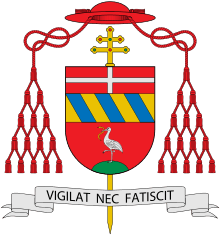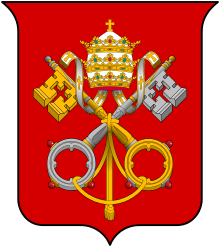Amleto Giovanni Cicognani
| Amleto Giovanni Cicognani | |
|---|---|
.jpg) | |
| President of the Governatorate of Vatican City | |
|
In office 12 August 1961 – 30 April 1969 | |
| Monarch |
John XXIII Paul VI |
| Preceded by | Nicola Canali |
| Succeeded by | Jean-Marie Villot |
| Apostolic Delegate to the United States | |
|
In office 17 March 1933 – 14 November 1959 | |
| Monarch |
Pius XI Pius XII John XXIII |
| Preceded by | Pietro Fumasoni Biondi |
| Succeeded by | Egidio Vagnozzi |
| Personal details | |
| Born |
24 February 1883 Brisighella, Italy |
| Died |
17 November 1973 (aged 90) Rome, Italy |
| Styles of Amleto Cicognani | |
|---|---|
 | |
| Reference style | His Eminence |
| Spoken style | Your Eminence |
| Informal style | Cardinal |
| See | Frascati (suburbicarian), Ostia (suburbicarian) |
Amleto Giovanni Cicognani (24 February 1883 – 17 December 1973) was an Italian Cardinal of the Roman Catholic Church. He served as Vatican Secretary of State from 1961 to 1969, and Dean of the College of Cardinals from 1972 until his death. Cicognani was elevated to the cardinalate in 1958. His brother, Gaetano Cicognani, was also a cardinal. To date they are the last pair of brothers to serve together in the College of Cardinals.
Career in the Church
Amleto Cicognani was born in Brisighella, near Faenza, as the youngest of the two children of Guglielmo and Anna (née Ceroni) Cicognani. His widowed mother ran a general store to support him and his brother, Gaetano.[1] After studying at the seminary in Faenza, he was ordained a priest on 23 September 1905 by Bishop Gioacchino Cantagalli. Cicognani continued his studies at the Pontifical Roman Athenaeum S. Apollinare, and in 1910 he was appointed an official of the Sacred Congregation for the Discipline of the Sacraments. First raised to the rank of Monsignor in 1917, he taught at his alma mater of the Athenaeum S. Apollinare from 1921 to 1932, and then entered the Roman Curia, as substitute adjunct of the Consistorial, on 16 December 1922.
After holding a variety of pastoral and curial positions, Cicognani was appointed Apostolic Delegate to the United States and Titular Archbishop of Laodicea in Phrygia on 17 March 1933. He received his episcopal consecration on the following 23 April from Cardinal Raffaele Rossi, with Archbishops Giuseppe Pizzardo and Carlo Salotti serving as co-consecrators, in the Roman church of Santa Susanna. Cicognani would remain Apostolic Delegate to the United States, serving as liaison between the American hierarchy and the Vatican, for the next 25 years.
During World War II, Cicognani expressed reservations about Zionism. In a letter dated 22 June 1943 to American representative Myron C. Taylor, he said: "It is true that at one time Palestine was inhabited by the Hebrew Race, but there is no axiom in history to substantiate the necessity of a people returning to a country they left nineteen centuries before …… If a 'Hebrew Home' is desired, it would not be too difficult to find a more fitting territory than Palestine. With an increase in the Jewish population there, grave, new international problems would arise."[2]
As Cardinal

He was created Cardinal-Priest of S. Clemente by Pope John XXIII in the consistory of 15 December 1958. Cardinal Cicognani was later raised to Cardinal-Bishop of Frascati on 23 May 1962. His elevation to the College of Cardinals is extraordinary in the fact that his brother Gaetano was also a cardinal, having been elevated in 1953, and an exception had to be made to the Church law prohibiting brothers from simultaneously being in the College together.
On 14 November 1959, Cicognani became Secretary of the Congregation for Oriental Churches. He was later named to the posts of Cardinal Secretary of State, President of the Pontifical Commission for Vatican City State, and President of the Administration of the Patrimony of the Apostolic See on 12 August 1961.[2][3] With the appointments of 1962, Cicognani essentially became the foreign minister, prime minister, and interior minister of the Vatican.
He attended the Second Vatican Council (1962–1965), at which he served as Chairman of the Secretariat for Extraordinary Questions.[4] Cicognani was also one of the cardinal electors who participated in the 1963 papal conclave, which selected Pope Paul VI.
On 30 April 1969, Cicognani resigned all of his posts. However, on 24 March 1972, he was elected and confirmed as Dean of the College of Cardinals and thus received the title of the suburbicarian see of Ostia, in addition to his title of Cardinal Bishop of Frascati.
Cicognani died in Rome, following a brief illness, at age 90.[5] He is buried in the Basilica di San Clemente.
The Italian prelate was considered to be rather conservative in his views. He sought to stem ecumenism in the Catholic Church in America,[6] and was once described as not being open to Aggiornamento.[7]
References
- ↑ Time Magazine. The Vatican's No. 2, 25 August 1961
- 1 2 The Evian Conference – Hitler's Green Light for Genocide Archived 2 November 2008 at the Wayback Machine.
- ↑ Cardinals of the Holy Roman Church. Cicognani, Amleto Giovanni
- ↑ Time Magazine. The Council's Prospects, 14 September 1962
- ↑ Time Magazine. Recent Events, 31 December 1973
- ↑ Time Magazine. Less Ecumenism, Please, 12 March 1965
- ↑ Time Magazine. The Fine Papal Art Of Creating New Cardinals, 9 June 1967
External links
| Diplomatic posts | ||
|---|---|---|
| Preceded by Pietro Fumasoni Biondi |
Apostolic Delegate to the United States 17 March 1933 – 14 November 1959 |
Succeeded by Egidio Vagnozzi |
| Political offices | ||
| Preceded by Domenico Tardini |
Cardinal Secretary of State 12 August 1961 – 30 April 1969 |
Succeeded by Jean-Marie Villot |
| Catholic Church titles | ||
| Preceded by Eugène-Gabriel-Gervais-Laurent Tisserant |
Dean of the College of Cardinals 24 March 1972 – 17 December 1973 |
Succeeded by Luigi Traglia |
